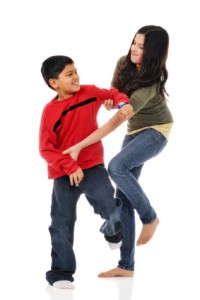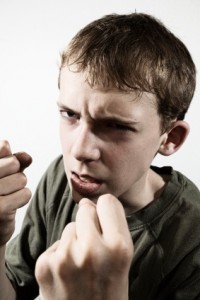|
|
September 15, 2011
 A little break gets you through the day When adults feel uncomfortable with what’s going on around us, we can often just up and leave.
But if you’re a tween or teen, from 8:20-2:55, Monday through Friday, you’re “doing school.” You’re in lock-down. If your peers make you feel uncomfortable or unsafe or worried or fearful, you’ve just got to suck it up.
Someone once said, “Real life is a mere shadow of high school.” For some kids who live and breathe the drama, they may look back at these years as the highlight of their life. When else do you get to feel so powerful as you immortalize other people’s humiliations? Broadcast their betrayals? Fire up the feuds with half-truths and lies? Middle and high school students who are into this game may love school because it’s the ultimate reality show and they and their friends are mega-stars.
But not all kids enjoy the sport of tearing down other students. If they themselves are targeted by bullies, they hate the whole scene. Even if the toxicity isn’t directed at them, many kids just don’t like being around it. Either way, where can a kid who wants to opt out of the social garbage and have some peace during lunch to retreat to?
Here’s my idea…
I propose an OASIS… one quiet room in every school, only open at lunch & staffed by a calm teacher who wants to be there. No talking. No texting. Just soothing music. A place where everyone is welcome to just be. Simple, right? All you need is a room. (One thing all schools have plenty of.) No funding. No curriculum. No tests. No thing. Just a room that’s always empty at lunch, a caring teacher and an understanding that we all need an OASIS.
Your thoughts?

May 16, 2011
by Suzanna Narducci
Suzanna Narducci is an avid tweeter, blogger and co-founder of TweenParent.com. She’s always been fascinated by the evolution of an idea into a successful business. After an interesting but intense run in the fashion business, Suzanna decided to switch gears and become a mother. As Suzanna’s children grew, she realized that a reliable and consolidated resource for parents of pre-teens was missing in the marketplace. Suzanna shared her idea with her friend and now business partner, Judy King-Murray, and TweenParent.com was born. We’re so glad that it was!
 Give it back you little @#$%! At some point in their lives, most kids experience bullying of some type – whether it is in school, in the neighborhood, online or another social situation. The truth is most kids will not only be bullied, but will also harass other kids. For parents, the challenge is how to help their children develop the social skills they need to positively assert themselves in negative situations.
Fortunately, what children learn at home is transferable to their outside interactions. In a study published by the British Journal of Developmental Psychology, Dr. Ersilia Menesini and her colleagues at the Universita’ degi Studi di Firenze found that there was a direct correlation between sibling bullying and victimization and bullying and victimization at school. In short, the roles kids play out at home are likely to be reenacted with peers. According to the study, the children in families with high levels of conflict and low levels of empathy were at greatest risk. In light of these results, Dr. Menesini recommends that parents actively mediate when their kids start arguing.
Of course, it is normal for brothers and sisters to argue. However, parents can help their children learn to move forward in conflicts in a way that is not hurtful by actively teaching them skills to gain empathy while positively asserting their feelings. Here are some suggestions to help parents teach their tweens how to resolve arguments in a positive way.
- Listen and Reflect. Expect your kids to listen to each other’s point of view. Teach them to repeat back what they’ve heard from each other and explain why they think that their siblings feel the way that they do. They don’t have to agree, just understand.
- Avoid the Blame Game. Talk about how each person contributed to the situation, rather than placing blame. Start sentences with “I felt” rather than “you did,” to dissipate defensiveness.
- House Rules. Name calling, belittling, undermining and teasing by anyone in the family is not only hurtful, but also damaging to a child’s self-esteem. Kids begin to believe that negative comments that are consistently repeated about them – even in jest or teasing — are true.
- Keep Perspective. Developing a healthy relationship between siblings takes time. The end goal is to help your kids learn both how to constructively express their feelings and develop a better understanding of their siblings’ feelings. This won’t happen overnight, but by feeling that their needs are also being considered to resolve conflict, they will gain confidence and, hopefully, experience less aggression.
If all goes well, your kids will not only develop the skills they need to help them in their social lives at home and beyond, but will also recognize that this type of interaction is healthy and normal will help them have emotionally fulfilling and trusting relationships as adults.

April 5, 2011
 That doesn't bother me... much Tweens and teens are famously self-conscious around their peers. The risk of falling short of what’s “cool” can be so intimidating it’s a wonder they crawl out of the sack and get themselves to school. Each day 160,000 American kids don’t bother. They can’t deal with the judgement, put-downs and out-and-out cruelty from other students so they stay home.
I know at least one adult who also wrestles with self-doubts. Before I leave the house for a speaking gig, I stress over my hair and what I’m wearing, especially when I’m presenting to middle schoolers. I try on a half dozen different tops, pants, earrings in an attempt to look cooler. I know it’s a total crap shoot and I’m sure I often fail miserably, but I make the effort because I want the kids to accept me. Kinda sweet and kinda pathetic too.
Why does it matter so much what other people think? Well, as a species we’re programed to try to get other folks to like us. We’re not the fiercest beasts in the jungle so we need to team up to survive. A team works for the mutual benefit of all members only if those members are on good terms.
And so, throughout the millennia, we’ve become skilled at decoding each other’s micro-expressions – fleeting facial indications of fear, disgust, surprise, approval, etc. When we see disapproval, it’s time to back-pedal… quick!
For example, suppose we’re chatting and I say, “Wow! Last night for dinner we had the best steamed okra.” I’m about to add, “You’ve gotta try this recipe!” But before I do, I detect a Yuck expression flit across your face. Uh-oh… I offended you. I’m in trouble! If you vote to kick me off the team my survival’s at stake. I’ve gotta figure a fast, face-saving move. I’ve got it! “Of course, not everyone likes okra…” I say with a charming smile. You nod and smile back. Phew! That was close!
I created this quiz to help kids start thinking about all this. Share it with your child. Take it yourself. Food for thought. Tastier than okra.
DO I WORRY TOO MUCH WHAT OTHER PEOPLE THINK?*
- If my friends think something is funny, I’ll laugh even if I don’t get the joke. True/False
- The worst thing is to do something embarrassing in front of people. T/F
- If everyone’s seen a movie but me, I’ll say I saw it. T/F
- If my parents think something’s a “good” idea, I’m suspicious. T/F
- I hate making decisions cause it sucks to be wrong. T/F
- I’m never the first person to give my opinion. T/F
- I’ve dropped out of an activity I liked because none of my friends were into it. T/F
- It’s risky to say how you really feel. T/F
- If someone makes fun of what I’m wearing, I won’t wear it again. T/F
- If my friends think something’s cool, I’ll try it even if I’m not sure I’ll like it. T/F
7-10 Trues: You worry what others think and it brings you down.With a boost in self-confidence and support from family and friends, you’ll trust yourself more and enjoy being you.
3-6 Trues: Sometimes it’s hard for you to stand up for yourself, but when you do it feels good. You’re getting better all the time at being your own person.
0-2 Trues: You hardly ever worry what others think because you’re self-confident and have a lot of self-respect. You may not know it, but people respect you for who you are.
*Excerpted from Be Confident in Who You Are, Book 1 of my Middle School Confidential series. Just released as a graphic novel iPad app (for ages 8-14) and now available from iTunes.

October 14, 2010
 Who do you think you are? Great gobs of vitural ink have been sloshed around describing America’s “decline.” In a recent Newsweek story about the 100 best countries we didn’t even make the top 10. We’re Number 11. But, it’s not like Newsweek dropped a bombshell. We’ve all noticed the slippage for a while. From family problems to school problems to dysfunctional legislators to holy book burners.
Oh yes, my friends, we’ve got Trouble with a Capital T that rhymes with D and that spells DECLINE. All the pity party laments boil down to just one thing: “America’s lost its competitive edge.”
Oh yeah? Not so fast, dude. Sure, we may be losing the competition for top world ranking in stuff like education, health, quality of life, economics, and political environment. But what about Top Dog status in stuff that really matters? For example, when it comes to vying for popularity within their peer group no kids on Earth come close to the clawing, biting, sheer grit of American teens.
In light of recent horrific in-your-face school bullying plus the cyber predator stealth assaults launched from smart phones and PCs, I think I’ve figured out what’s driving at least part of it. It’s competition. And we’re scary good at it.
I’m sure we’d all agree that we hate bullying behavior. And it goes without saying we hate bullies. Every last one of them. But for the record, there is no them. It’s all us. From time to time, to one degree or another, consciously or un, we all dismiss other people as unworthy of respect. Folks, that’s the core of bullying. And we behave that way when we’re competing with each other.
Think about it. If you’re hotter (or cooler) than me or I’m hotter or cooler than you, we may distrust each other. We may try to bring each other down in thought, word or deed. If you’re smarter than me or way stupider, you’re on my hit list. If you’re fatter than me or thinner, if you wear more or less expensive clothes, if you’re a super jock or a super geek… watch out! ‘Cause whatever we are that’s “different” may be seen as a threat to someone else’s never-ending quest for votes, money, power, friends… love. And we all know what happens when we feel threatened. We attack. Sounds ruthless, but we’ve gotta get real. We’re on the edge here. Each one of us adults and kids, we’re socialized and primed to compete with each other and often that means giving each other a hard time.
So, you still in this competition or are you ready to opt out?
UPDATE: 2/2/12: Just got this great bullying awareness and prevention info-graphic from @MAT@USC aka, Master of Arts in Teaching… because it is an art!
 — Older Posts »
| |















